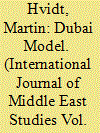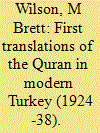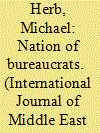|
|
|
Sort Order |
|
|
|
Items / Page
|
|
|
|
|
|
|
| Srl | Item |
| 1 |
ID:
090266


|
|
|
|
|
| Publication |
2009.
|
| Summary/Abstract |
The developmental process as it unfolds in Dubai has hardly been analyzed by academics. Most current knowledge about the country originates from media coverage, especially from news magazines and business literature. Recently a number of social science based but historically oriented academic publications have appeared. Only one study, however, has seriously sought to place Dubai in a broader developmental framework: Sampler and Eigner's From Sand to Silicon, published in 2003. Yet, by applying the so-called strategic trajectory model to the case of Dubai, they reduce their focus to the management side. Their aim is too narrow to provide an explanation of the overall development process in Dubai.
|
|
|
|
|
|
|
|
|
|
|
|
|
|
|
|
| 2 |
ID:
090269


|
|
|
|
|
| Publication |
2009.
|
| Summary/Abstract |
The debut of Turkish-language translations of the Qur?an in the newly founded Republic of Turkey sparked lively debates over whether Qur?an translation was possible or desirable, who should engage in interpretation of the text, and what characteristics a Turkish-language rendering of the Qur?an should have. Whereas the abolition of the Islamic caliphate, closure of the medreses, and prohibition of the Sufi orders have received considerable attention in histories of early republican Turkey, the state-sponsored translation of the Qur?an into Turkish remains both neglected and misunderstood. Muhammad Rashid Rida, who was highly influential in shaping opinion in the Muslim world, portrayed the state-sponsored project as a long-term plot to displace the Arabic Qur?an. Other accounts misrepresent the involvement of President Mustafa Kemal (Atatürk) in the promotion of Qur?an translation by anachronistically suggesting that he sparked the initiative and led a "campaign" in support of it. Mustafa Kemal had no hand in the composition of Turkish Qur?an translations published in 1924, other than helping create the political context in which they could be published. Their composition began well before the foundation of the Turkish republic, and their inspiration emerged from the intellectual milieu of the late Ottoman public sphere.
|
|
|
|
|
|
|
|
|
|
|
|
|
|
|
|
| 3 |
ID:
090263


|
|
|
|
|
| Publication |
2009.
|
| Summary/Abstract |
Not long ago, two safe generalizations could be made about the Gulf monarchies: ruling families dominated their politics, and oil dominated their economies. In recent years that has begun to change. In Kuwait the parliament challenges the political predominance of the ruling family. Meanwhile, Dubai and, increasingly, the other emirates of the United Arab Emirates (UAE) have made real progress in diversifying their economies away from oil-at least until the recent economic crisis. Yet political liberalization and economic diversification have not gone hand in hand: Kuwait's economy remains dependent on oil, and the United Arab Emirates remains resolutely authoritarian. This is no accident. Kuwait's high level of political participation encourages its dependence on oil while the UAE's economic diversification requires a lack of political participation by citizens. The reasons for this are specific to the peculiar political economy of these labor markets: in these richest of rentier-states, there is little need for the class compromise between capitalists and workers on which capitalist democracy usually rests.
|
|
|
|
|
|
|
|
|
|
|
|
|
|
|
|
| 4 |
ID:
090271


|
|
|
|
|
| Publication |
2009.
|
| Summary/Abstract |
Employing rhetoric all too familiar to Turks today, major metropolitan newspapers in Turkey in December 1952 and January 1953 raised the specter of widespread Islamic or religious "reaction" (irtica). Staunch defenders of Mustafa Kemal Atatürk's policy of secularism, or laiklik, journalists in Istanbul and Ankara identified the existence of a "black press" (kara bas?n) manipulated by religious "reactionaries" (mürteci) determined to use print media to challenge the very secular foundations of the modern Turkish nation and to upset the established order. To prevent this, the time had come to prosecute vigorously both individuals and organizations that used newspapers or journals to exploit religion and promote obscurantist propaganda. Chief among these was not a metropolitan publication but, rather, an incendiary religious newspaper produced in the Black Sea city of Samsun-the very same city in which Mustafa Kemal had first set foot in 1919 in his efforts to lead what became the Turkish War of Independence. This black newspaper was Büyük Cihad, "The Great Struggle."
|
|
|
|
|
|
|
|
|
|
|
|
|
|
|
|
| 5 |
ID:
090272


|
|
|
|
|
| Publication |
2009.
|
| Summary/Abstract |
In December 1977 an independent candidate named Mehdi Zana was elected mayor of Diyarbak?r, one of the biggest cities in Turkey's southeastern region. His election was a striking event, upsetting the troika of class, party, and state that had maintained a tight hold over the local political apparatus in Diyarbak?r since the 1940s. Unlike most prior mayors of Diyarbak?r, Zana did not come from a prominent family of local notables but was a working-class tailor with a middle-school education. He was one of only two independent candidates who won electoral contests in Turkey's sixty-seven big-city races; his election therefore flew in the face of a national trend that favored candidates from the country's two main political parties. Zana was well known for his left-wing, Kurdist politics, and at the time of his election he already had spent several years in jail for his activism. In a system that suppressed collective expressions of Kurdish identity, he was thus a clear ideological interloper.
|
|
|
|
|
|
|
|
|
|
|
|
|
|
|
|
|
|
|
|
|